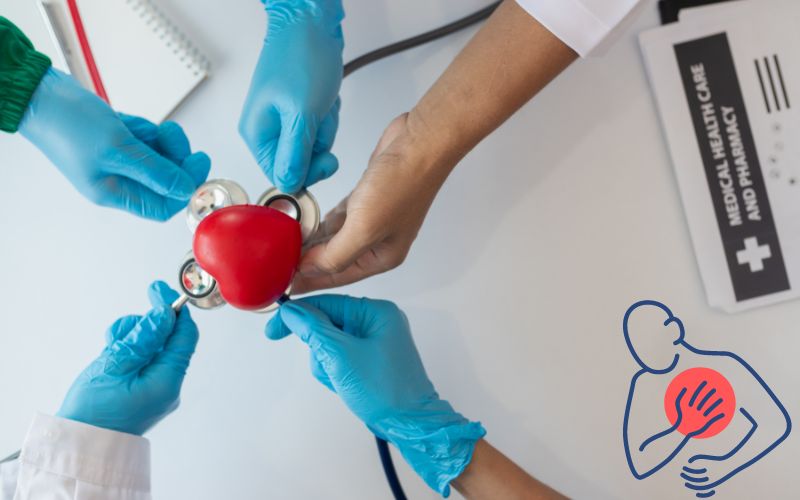Angina is commonly referred to as chest pain, a condition in which the heart muscles do not receive adequate blood flow. Reduced blood flow can cause an ache or even pain in one’s chest. It is one of the most common symptoms experienced in coronary artery disease, where the arteries carrying blood supply to the heart begin to narrow or get blocked.
Angina can be a major health issue because it may pose complications if not treated in time. The symptoms must also be evaluated in the early stages so that severe complications do not develop. Let us learn more about this health condition.
Types Of Angina
Each of the types of Anginas differs in characteristics, thus affecting considerably its symptoms, severity, and complications:
- Stable Angina: This is the most common one. It usually occurs on exertion, such as walking uphill or exercising. This will usually resolve with rest or medications.
- Unstable Angina: This is a medical emergency. The chest pain is more severe, or it lasts longer than that from stable one and tends to occur with low levels of activity or even at rest. It is considered to be a heart attack.
- Variant Angina: This is due to spasms of coronary arteries. The pain typically occurs at rest and resolves with therapy.
Symptoms Of Angina
All these Angina Symptoms are not the same for everyone. Some suffer from one or two, while others, experience them all. The severity and duration of angina can be different from person to person. Chest pain or discomfort is the primary symptom of angina. Angina Pain could be felt like:
- A squeezing or pressure in the chest, as if a heavy weight is sitting on it.
- Burning sensation, as with heartburn.
- Pain or aching in the centre of the chest can also feel heavy.
- Pain that spreads to the shoulders, arms, neck, jaw, or back.
Other symptoms may include:
- Shortness of breath even when resting
- Tiredness, feeling exhausted
- Sweating though is not too warm.
- Nausea and vomiting
- Dizziness and lightheadedness.
Causes Of Angina
The primary cause of angina is coronary artery disease (CAD). This is because, through the formation of plaque inside the coronary arteries, they narrowed and consequently reduced blood supply to the heart. The other factors are as follows:
- High blood pressure
- High cholesterol
- Diabetes
- Smoking
- Obesity
- Family history of heart disease
- Stress
Is Angina Dangerous?
While angina itself is not life-threatening, it may be a sign of a more serious condition, such as a heart attack. That is, if chest pain is felt to be minor or subsiding, it is very important to go see a doctor promptly. The most dangerous type of this condition is unstable angina, in which pain occurs at rest or even with minimal exertion. This is a sign of a heart attack, and without prompt treatment, things may quickly turn for the worse.
Treatment For Angina
The treatment depends on the severity and type of angina. Many different treatments can be applied to manage angina, such as non-invasive cardiology treatment like medications, lifestyle changes, and Cardiology Treatment Surgery. Here are the common treatments for angina:
A. Medicines:
The use of the following medications can help to ease the symptoms of heart problems and reduce the risk of complications:
- Beta-blockers: This medication lowers heart rate and blood pressure.
- Calcium channel blockers: This medication relaxes the contraction of muscles in the walls of blood vessels and thereby promote improved flow of blood.
- Nitrates: This medication expands the walls of blood vessels and promotes improved blood flow to the heart.
- Aspirin: This medicine thins blood and prevents clot formation.
B. Lifestyle Changes:
Adopting the following healthy habits can significantly improve overall heart health:
- Quitting smoking reduces the risk of heart disease and improves blood flow.
- A healthy diet focuses on fruits, vegetables, whole grains, and lean proteins.
- Regular exercise improves heart health and helps manage weight.
- Stress management: techniques like meditation or yoga can reduce stress.
C. Procedures:
In some cases, you can consult the Best Cardiologist In Delhi. These Cardiologists In Delhi can help you with the medical procedures, which may be necessary to restore blood flow to the heart.
- Angioplasty: A procedure to widen narrowed arteries using a balloon.
- Coronary bypass surgery: A procedure to bypass blocked arteries with grafts.
Prevention Of Angina
Many of the following habits are used for angina treatment and prevention:
- Healthy diet
- Proper exercise
- Healthy weight
- Quit smoking
- Reduction of stress
- Control of high blood pressure and cholesterol.
Angina is one of the common medical conditions that may be both uncomfortable and dangerous. If you experience any pain or discomfort in the chest, you should seek medical attention immediately and consult a good cardiology specialist or visit a heart hospital without any delay.








